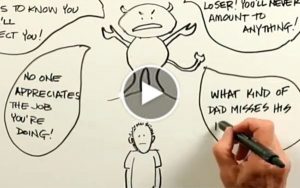It’s Not Me: It’s My OCD: Overcoming Obsessive Compulsive Disorder

My cynical 16-year-old face would grimace each and every time. My older sister’s gentle, yet insistent voice: “Just tell yourself, ‘It’s not me’ it’s my OCD.’”
“How corny,” I would think before retaliating with, “You don’t understand, it is me.” These were my real thoughts. Real fears. I had real reasons to wash my hands 10 times an hour, to open doorknobs with my elbows, to avoid contact with bed sheets and dollar bills, to fear the tiniest speck of red on any carpet, because it could be blood – yes, blood. Obsessive compulsive or not, these were my thoughts, and nothing it seemed could make them go away.
At that point, the low point, it didn’t matter that my hands were literally cracked from being scrubbed so many times a day or that I could barely leave my room for fear of what I’d come in contact with in the outside world. All that mattered were the thoughts, the ever-present internal alarm system that told me when and what to fear. “Don’t touch that!,” it would say about a computer keyboard or a car door. Yet, no matter what I did – or didn’t do – the voices kept getting louder, and with my system constantly on high alert, I was beginning to watch my “normal” life slip away.
The scariest thing about OCD is how real it feels when you’re experiencing it. Crazy as it may look to an outside observer watching you switch on and off a light several times or count to four before entering a room, these are things your brain is telling you to do, as if they are completely routine methods of behavior – as if there was no other way to turn on a light or enter a room.
This is not to say that those of us who’ve suffered with OCD are not conscious of the neurotic or unusual implications of our behavior. I was very much aware that no one else engaged in my odd rituals. Stopping them may have seemed easy to someone who’s never known OCD, but stopping them meant standing up to my own brain, which was screaming at me to comply.
If I didn’t listen to the obsessive-compulsive thoughts, I believed I would be overwhelmed by fear and anxiety. On top of that, the thoughts were tricky, because they often sounded more soothing than threatening. The instructions from my brain were not always, “Don’t do this or else…” They were more like, “Just do this one thing, and you’ll have nothing to worry about.” This made it much harder to resist actions like washing my hands and avoiding contact with “contaminated” objects.
The trouble, however, was that the promise that just taking this one little action would leave me worry-free was never fulfilled. Even if an action like opening the door with my elbow relieved me for a brief moment, another thought would pop into my head straight away telling me to do something else: inspect the knob for dirt, change out of the sweater that had touched the knob, clean the knob with sanitizer, then wash my hands to remove all remnants of the stressful incident – the “stressful incident” being something like entering my kitchen.
The more I gave in, the stronger the thoughts became. OCD is like a monster living inside you. The more you feed it, the bigger and stronger it grows. The more you starve it, the smaller and weaker it becomes. But when that monster is living in your head, starving it is tricky and often terrifying.
When I refused to see a therapist, my older sister, a psychologist who knew a lot about OCD and how to treat it, stepped in. She explained to me that there is a program I can do that can actually change my brain and train it not to be afraid. At the time, I just couldn’t believe her and felt that, even if she was right, it just wasn’t worth taking all the steps the program involved – too risky and too terrifying.
Put simply, what the program involved was listing all of my fears on a scale from 1-10 and each day taking an action that went against the corresponding fear, starting from the least scary and working up to the scariest. All of this was done with no hand washing and limited showering. I was sure I couldn’t do it, but on some level, I knew I had no choice.
A day after making my list (the easy part), the hard work began. Everyday I would have to meet with my sister and touch something that scared me. It didn’t start out too bad. Day One, I had to touch a couple door knobs in my house or an old purse I had abandoned due to “contamination” (objects that were ranked as level ones). By Day Five, I was in a war zone. I screamed at my sister as she softly convinced me that I wouldn’t get better unless I touched the dirty laundry she held out in front of her. To make matters worse, after I touched it, she would make me face my biggest fear: eating with my seemingly spotless (but in my eyes filthy) hands. The horror was unbearable. I behaved like a torture victim, blasting my enemy/older sister, as if she was trying to destroy me.
Many times the struggles would last for hours, but they would all end the same; I would do what my sister asked, as long as she, my younger sister or a close friend, who I trusted and considered pure, would do the same. While the support and participation of my family was fundamental to the process, I wasn’t allowed to obsessively seek reassurance from anyone, as it fed into my entranced, cyclical thinking. When I asked my sister if she thought I was gross for touching a stranger’s arm or if she believed the dust from the laundry machine could have gotten on me, I was weakening my own belief in the contrary of each scenario. I wasn’t building the strength I needed to counter these absurd associations.
Throughout each horrific hurdle, my sister never grew impatient or sounded unkind, even as I attacked her with terrible insults. After completing each task, my face swollen and red with tears, I would feel sad but never as afraid as I felt in the anticipation. My sister would then help me with the most important follow-up step, distraction. To overcome obsessive compulsive disorder, you must not only resist the compulsions but stop the obsessing. To do this, my sister had me list things I enjoyed that calmed me down or demanded my attention. This being a rare instance where mind-numbing activities were actually encouraged and considered healthy, I did things like play video games, go shopping and eat foods I liked but rarely indulged in. Sure enough, I would always get distracted and tune out my previously tormented state.
By the end of each day, I would feel calmer and strangely relieved – with my biggest fears behind me. Feeling more like my old self, I would apologize to my sister for my outbursts and thank her for helping me. This would last until my next challenge, now bigger and scarier and closer to level 10. Still, by the end of one month, I successfully reached level 10. Ironically, at this point it was actually a little easier to do the tasks that had once scared me the most than some of the lower ranked ones I’d completed a few weeks prior.
Level 10 was soon complete, and I was on my way down the mountain. The world looked and felt different. Slowly, I was allowed more showers and rights to soap several times a day. As I readjusted to my old lifestyle, I was amazed by the new freedom I felt. I literally couldn’t believe the things that had once scared me.
Like any recovering addict, I knew not to take chances, knew that giving an inch could take a mile. When others acted grossed out by public restrooms or smelly foods, I knew not to turn my nose up and avoid what once terrified me. I knew that in my brain there was still a sticky switch – ready to turn on the minute I fed it power. But I also knew that I had the power to control this switch, that the rest of my brain could outsmart that small part that told me to think and rethink and question and speculate and worry. I finally knew what was me and what was my OCD, and I’ve never forgotten since.
Tags: living with obsessive compulsive disorder, obsessive compulsive disorder, OCD









This account has really moved me. I have known a teenager who also overcame this hurdle, and it is humbling and eye opening to read the inner story as presented here. My warmest thoughts are with you. The teenager I mention is bright and thoughtful and full of life, and I love her very much. I appreciate so much you sharing your experience.
I really connected with this article. While my OCD isn’t centered around contamination fears (mine revolve around health fears and checking), the powerful hold OCD has on me mirrors this account. I’ve started a blog at myocdbrain.com to provide an outlet for what I wrestle with. I welcome comments. The more we can attach real faces to this “monster” (I loved that comparison), the more equipped we will become to defeat it.
Lets just say that I have suffered for over 25 years, and have experienced what many have others and some very unique obsessions and compulsions which are differen: it is so complex. It would take many pages to describe only a few minutes of my daily life. I am combating my OCD now directly, (not the first time, but it’s different now), but it’s a beast. I am looking for others with highly unique OCD experiences to chat with.
Oh funny to, my younger sister has been a therapist for about 10 years now. My mother always acted “embarrassed” about it and tried to keep it hidden from people, but my sister know what’s up. I type this from my own house. Most people in my condition live at home with parents or are hospitalized, but fortunately my parents bought a house for me. I have just about experienced what most other people have, (most years ago) but it has developed into something else, more advanced, and made me more weary: kind of like protracted war in which it has become more seasoned and I have become more hardened.
I finally finished the rest of the article (I felt inclined to comment immediately after I began reading), and I have to say, I’m glad you got the help that you needed.
You were brave to share your story. And you are so lucky to have a sister who cares so much about you. Best of luck.
Melissa